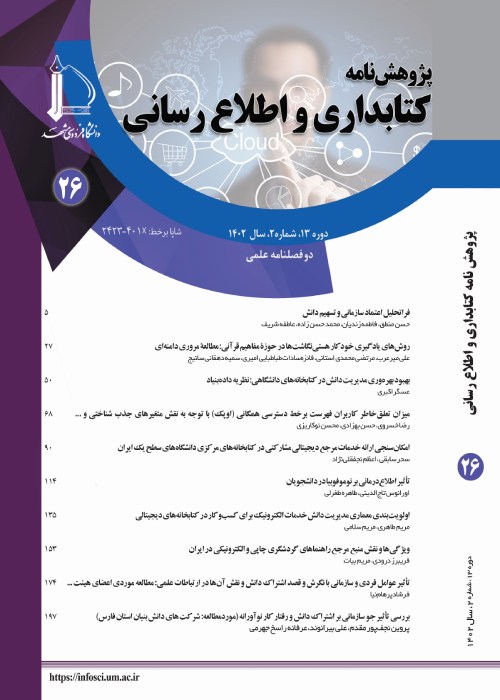Improving Knowledge Management Productivity in Academic Libraries: A Grounded Theory
Productivity is an important topic in knowledge management that plays an effective role in improving the optimal use of resources, services and employees. With knowledge management, economic, technical and cultural attitudes towards production and organizations in a competitive world, they are intelligently trying to get the best results with the least cost and time from their activities. In the meantime, university libraries, as "knowledge portals" and organizations active in the public sector are bound to improve the efficiency of financial resources, maintain information resources and knowledge forces and improve the efficiency of knowledge management is considered a necessity for libraries to maintain efficiency. Therefore, the present study was conducted to provide a model for improving productivity in academic libraries as a roadmap for their future.
The current research is based on the fundamental goal and qualitative nature and is a part of exploratory research that was carried out with the "grounded theory" approach. The statistical population of the research includes 16 experts and faculty members of universities in the fields of management, knowledge and information science, and information technology. The interviewees were selected based on having sufficient history and experience and being interested in the research subject and they were selected according to their expertise and skills using the purposeful sampling method. Research data was collected using a semi-structured interview method with a systematic approach and using open questions. After each interview, to increase accuracy, the interviews were reviewed so that if there was any ambiguity in the understanding of the stated content, it could be corrected with the opinion of the interviewee. After performing the initial steps of analysis, to ensure the correctness of the interpretation, the content and their interpretation were again presented to the participants so that the content can be edited by the interviewees if needed. In the end, the data validity and reliability method with four criteria of credibility, transferability, dependability and confirmability of Lincoln and Guba was used to measure the reliability of the results. To analyze the data, a three-stage design of open, central and selective coding was used.
In examining the categories, during the coding process of 281 open codes from the data obtained from the research interviews, 71 subcategories were coded and extracted. Then, axial coding was done based on the paradigm model. At this stage, the codes that had similar concepts were gathered in the form of a family under one concept. Finally, by using the selective coding of the conceptual model in the form of a paradigmatic model of the categories were outlined as: a) causal conditions; communication channels, management factors, organizational factors, individual factors, technical factors, b) the main phenomenon; Improving the productivity of knowledge management, c) Intervening conditions; external factors and internal factors, d) background conditions; motivational factors and internal organizational factors, e) strategies; Designing a creative and efficient system, designing an information economy system, designing an integrated content management system and designing an efficient system for supporting academic staff, f) consequences; Rapid sharing of knowledge, cost reduction, accessibility of resources, improvement of the work of knowledge workers and tangible income generation from knowledge
The drawing model showed that the extracted pattern of the research can be used as a road map to achieve the goal of improving the efficiency of knowledge management in university libraries, especially in the economic recession when libraries are in the purgatory of services; on the one hand, libraries are obliged to distribute information fairly and on the other hand, the staggering costs and the lack of facilities have reduced the ability to provide appropriate services. Therefore, it seems that the creative economy strategy, which is based on art, culture and sciences can lead to the information economy. Libraries earn money through digital information and services, production, distribution, marketing, pricing, sales, storage, and processing of information compensate for part of the costs. Of course, it should be noted that the creation of knowledge management infrastructure for the development of new technology equipment and digital communication requires cost and investment. As a result, it is expected that library services will be effective and efficient against the costs it creates. Therefore, it seems that paying attention to the creative system, information economy, integrated content management system and the use of creative forces can be effective in improving productivity. Of course, on the condition that the evaluation of the effective factors of productivity, the examination of strengths and weaknesses, the use of creative methods, and scientific thinking in removing obstacles to improving productivity should not be forgotten.
- حق عضویت دریافتی صرف حمایت از نشریات عضو و نگهداری، تکمیل و توسعه مگیران میشود.
- پرداخت حق اشتراک و دانلود مقالات اجازه بازنشر آن در سایر رسانههای چاپی و دیجیتال را به کاربر نمیدهد.



